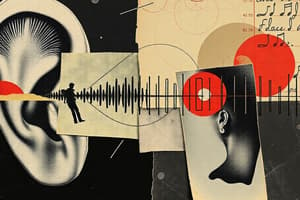Podcast
Questions and Answers
What is the branch of science that deals with the diagnosis and management of hearing and balance disorders?
What is the branch of science that deals with the diagnosis and management of hearing and balance disorders?
Approximately how many people worldwide are affected by hearing loss?
Approximately how many people worldwide are affected by hearing loss?
Which comorbidity may occur due to untreated hearing loss?
Which comorbidity may occur due to untreated hearing loss?
What is the process of measuring an individual's hearing ability called?
What is the process of measuring an individual's hearing ability called?
Signup and view all the answers
Which type of hearing loss is particularly prevalent among the elderly?
Which type of hearing loss is particularly prevalent among the elderly?
Signup and view all the answers
In audiometry, what type of test assesses sensitivity to different pitches?
In audiometry, what type of test assesses sensitivity to different pitches?
Signup and view all the answers
What are Dutch Matrix Sentence tests commonly used for in audiometry?
What are Dutch Matrix Sentence tests commonly used for in audiometry?
Signup and view all the answers
Which of the following is NOT a type of hearing aid mentioned in the text?
Which of the following is NOT a type of hearing aid mentioned in the text?
Signup and view all the answers
What is the primary symptom associated with balance disorders?
What is the primary symptom associated with balance disorders?
Signup and view all the answers
What is a common treatment strategy for tinnitus mentioned in the text?
What is a common treatment strategy for tinnitus mentioned in the text?
Signup and view all the answers
Which of the following is NOT a potential cause of tinnitus according to the text?
Which of the following is NOT a potential cause of tinnitus according to the text?
Signup and view all the answers
What advanced technologies are modern hearing aids equipped with?
What advanced technologies are modern hearing aids equipped with?
Signup and view all the answers
Study Notes
Understanding Audiology: Hearing Loss, Audiometry, Hearing Aids, Balance Disorders, Tinnitus
Introduction
Audiology is the branch of science that deals with the diagnosis and management of hearing and balance disorders. It involves the evaluation, interpretation, and enhancement of auditory function. In this article, we will discuss various aspects of audiology, including hearing loss, audiometry, hearing aids, balance disorders, and tinnitus.
Hearing Loss
Hearing loss is the most common sensory deficiency, affecting approximately 432 million people worldwide. It is more prevalent among adults, with over 5% of the global population affected. Untreated hearing loss can lead to significant problems in communication, impacting overall quality of life. Comorbidities like social isolation, loneliness, depression [14,15,16], and even dementia [21,22,23,24] may also occur due to hearing loss.
There are several causes of hearing loss, including degenerative processes associated with aging, genetic mutations, noise exposure, exposure to ototoxic medications, and chronic conditions. Age-related hearing loss, known as presbycusis, is particularly prevalent among the elderly.
Audiometry
Audiometry is the process of measuring an individual's hearing ability. It typically involves conducting pure tone audiograms, which assess sensitivity to different pitches, and speech audiometry, which evaluates the ability to understand spoken words. Various tests, such as cochlear implant performance assessments and Dutch Matrix Sentence tests, are employed in audiometry to evaluate hearing capabilities comprehensively.
Hearing Aids
Hearing aids are electronic devices designed to amplify sounds for individuals with hearing loss. They come in different types and styles, including behind-the-ear (BTE) aids, in-the-ear (ITE) models, and completely in-canal (CIC) versions. Modern hearing aids incorporate advanced technologies like digital processing and wireless connectivity to enhance overall performance.
Balance Disorders
Balance disorders involve issues with spatial orientation and equilibrium, leading to symptoms such as dizziness or vertigo. Conditions like Meniere's disease, vestibular migraines, and benign paroxysmal positional vertigo (BPPV) fall into this category. Auditory rehabilitation programs often focus on managing these balance disorders alongside treating hearing loss.
Tinnitus
Tinnitus refers to the perception of ringing, buzzing, or hissing sounds in the ears when no external noise is present. It can be a symptom of various underlying conditions, including age-related hearing loss, a side effect of certain medications, or a secondary consequence of traumatic brain injuries. Treatment strategies for tinnitus range from counseling and sound therapy to medication and surgery.
In conclusion, audiology encompasses a broad spectrum of practices aimed at addressing various hearing and balance-related conditions. From identifying and diagnosing hearing loss to providing appropriate treatments including hearing aids and counselling, audiologists play a crucial role in improving the quality of life for individuals experiencing these conditions.
Studying That Suits You
Use AI to generate personalized quizzes and flashcards to suit your learning preferences.
Description
Test your knowledge on audiology, including topics such as hearing loss, audiometry, hearing aid types, balance disorders, and tinnitus. Explore key concepts in diagnosing and managing auditory and balance-related conditions.




